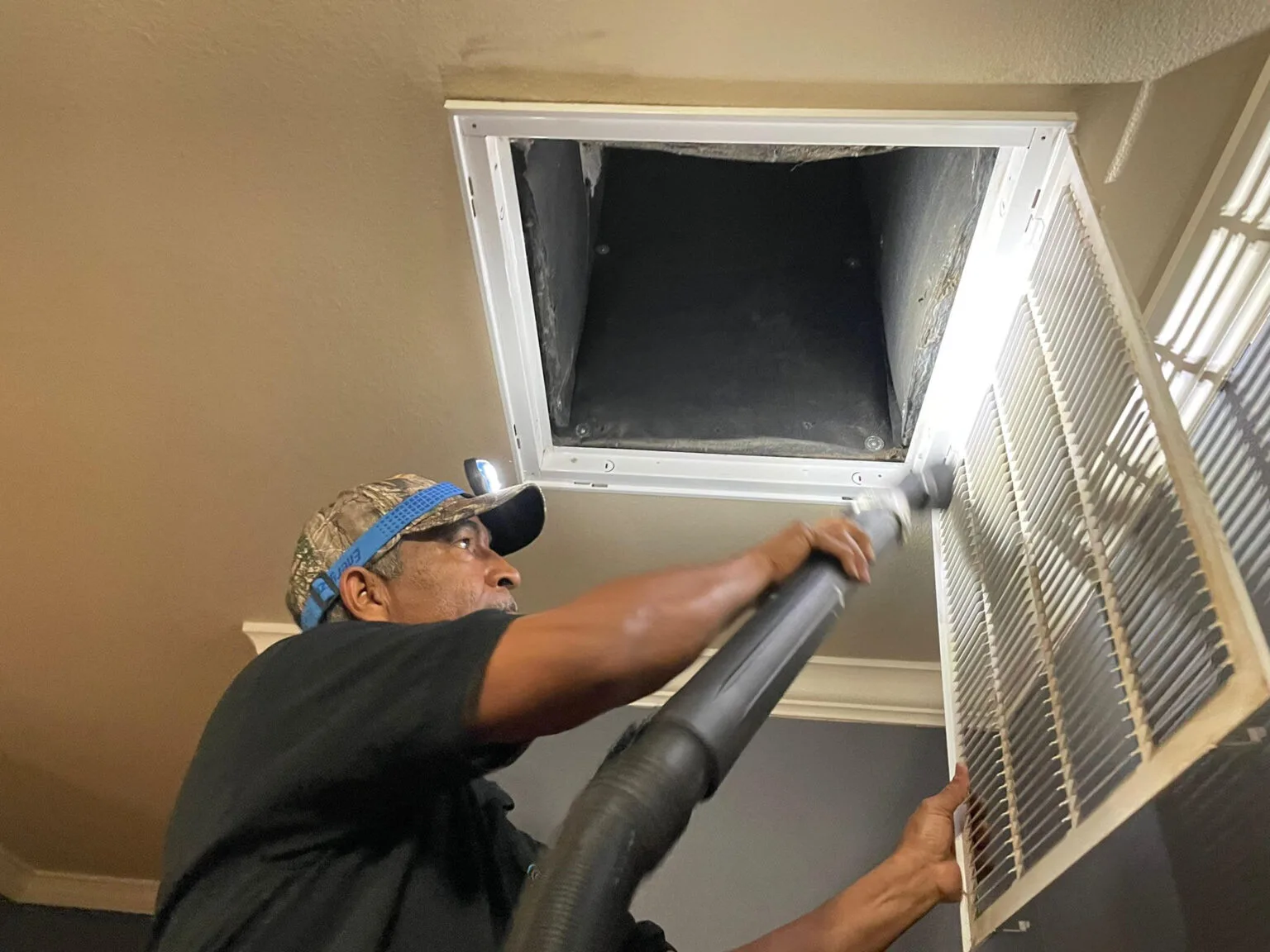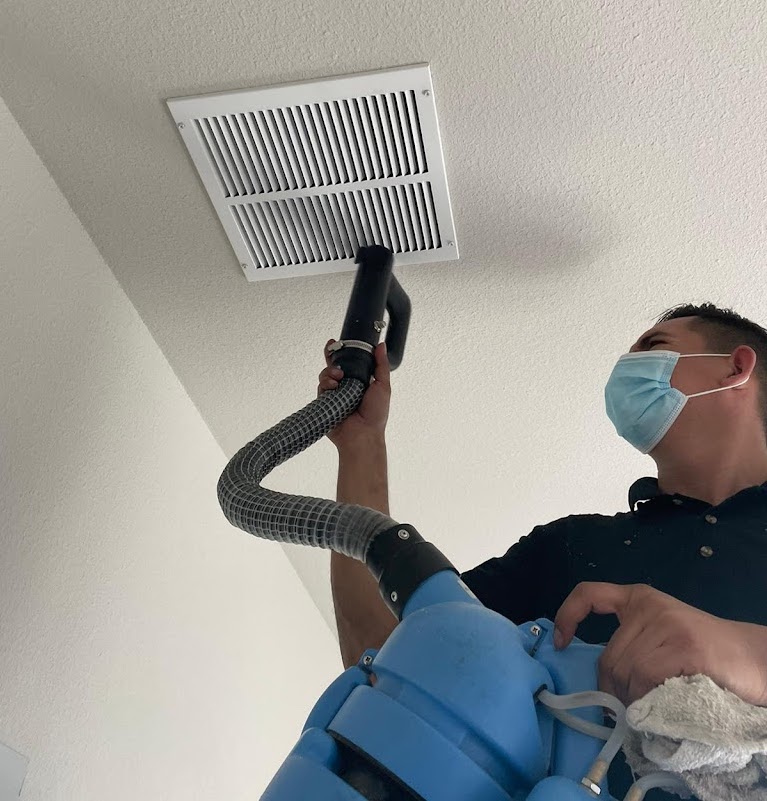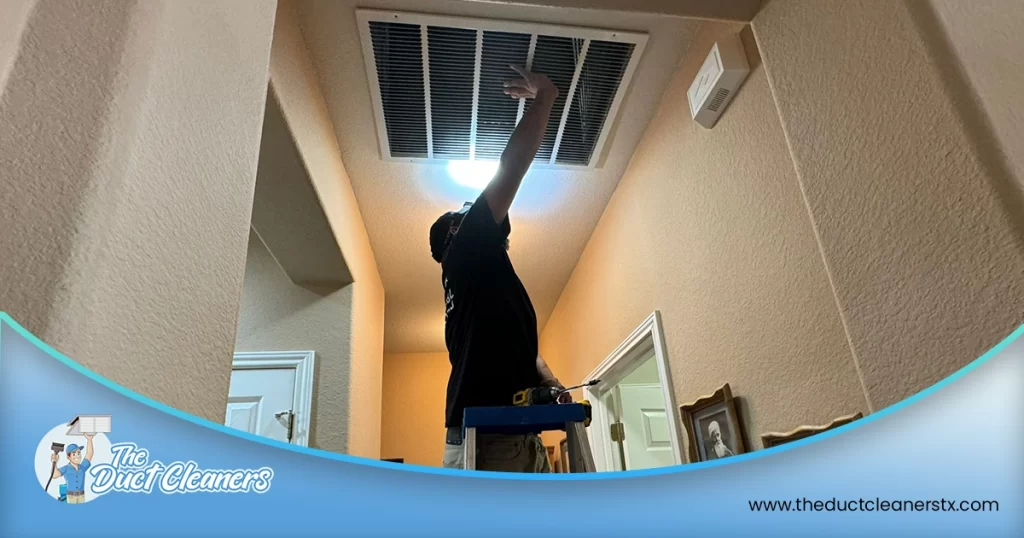What is HVAC Cleaning?
HVAC cleaning refers to the process of cleaning the various components of your heating, ventilation, and air conditioning (HVAC) system. This includes air ducts, filters, coils, fans, and the system’s drain lines. Over time, dust, dirt, mold, allergens, and other contaminants can build up in these parts, affecting the system’s efficiency and indoor air quality. HVAC cleaning helps ensure your system runs smoothly and that the air in your home or office is clean and healthy.
The cleaning process is usually carried out by professional HVAC contractors who follow industry standards for cleaning HVAC systems, such as those established by the National Air Duct Cleaners Association (NADCA).
Key components cleaned include:
- Air Ducts: The pathways that carry heated or cooled air throughout your home or business.
- Air Filters: They trap dust and other particles to ensure clean air circulates, but they can get clogged with time.
- Coils (Evaporator and Condenser): These are crucial for cooling and heating processes. Dirty coils reduce the efficiency of your HVAC system.
- Fans and Blowers: These circulate the air and can accumulate dust and debris.
- Drain Lines: These remove condensation created by the system, but if clogged, they can cause moisture issues.

How Does HVAC Cleaning Work?
The cleaning process involves multiple steps to ensure your HVAC system is properly cleaned and restored to its optimal functioning condition.
Step-by-step HVAC cleaning process:
Inspection:
- The HVAC technician will first inspect the system. They’ll check for any signs of dirt, mold, or other issues that might require cleaning. The technician may use specialized tools like cameras or airflow meters to get a clear view inside the ducts and other components.
Cleaning the Air Ducts:
- Brush and Vacuum: The ducts are cleaned using large, powerful vacuums and brushes to remove dust, dirt, and debris. The vacuum is often connected to a truck-mounted system to ensure the contaminants are sucked out of the house.
- Agitation: Sometimes, mechanical agitation tools (such as rotary brushes or air whips) are used inside the ducts to loosen debris stuck to the walls.
Cleaning the Coils:
- Evaporator and Condenser Coils are cleaned using non-abrasive cleaning agents to remove grime, dust, and other debris that may have built up on the coils. This ensures that the HVAC system’s heat exchange process works efficiently.
Cleaning the Fans and Blowers:
- These parts are cleaned using air pressure, brushes, and sometimes cleaning solutions to remove the buildup of dust and debris that can obstruct airflow.
Filter Replacement or Cleaning:
- Air filters are either cleaned or replaced depending on the type of filter. This helps ensure proper airflow and air quality.
Drain Line Cleaning:
- The condensation drain line is cleaned to ensure there is no buildup of mold, algae, or debris, which can cause water damage or poor system performance.
Sanitizing (Optional):
- In some cases, professionals might use a sanitizing solution to eliminate germs, bacteria, or mold inside the system. This is particularly important if there’s been mold growth inside the ducts or coils.

Benefits of HVAC Cleaning
Regular HVAC cleaning has several important benefits for both the system and the people in the building. Here are the key advantages:
a. Improved Indoor Air Quality
- Dust, pollen, mold spores, and other allergens can accumulate in your HVAC system over time. When the system is running, these contaminants get circulated through the air, negatively impacting indoor air quality. Cleaning the system can help reduce allergens and improve the overall air quality, making your living or working environment healthier.
b. Enhanced Energy Efficiency
- A dirty HVAC system can lead to poor airflow, which makes the system work harder to heat or cool your space. This additional strain can increase energy consumption and raise your utility bills. Cleaning the components, such as the filters, coils, and ducts, helps the system run more efficiently, ultimately saving you money on energy costs.
c. Longer System Lifespan
- Regular cleaning and maintenance prevent dirt and debris from accumulating on key components like the coils and fans. This reduces the likelihood of system breakdowns and can extend the lifespan of your HVAC system, helping you avoid costly repairs or replacements.
d. Reduced Risk of Mold and Mildew Growth
- When moisture is present in the system (such as condensation on the evaporator coils), it can create an environment conducive to mold and mildew growth. These contaminants can spread throughout the air, posing health risks. Regular cleaning helps remove moisture buildup and minimizes the chance of mold growth inside the system.
e. Better Comfort and Consistent Airflow
- A clean HVAC system ensures that air flows freely and evenly throughout your space. This leads to more consistent temperatures and better overall comfort, as the system doesn’t have to work harder to maintain the desired temperature.
f. Reduced Dust and Dirt Around the Home
- As your HVAC system distributes air throughout your home, it also distributes dust and dirt. A clean system can help reduce the amount of dust settling on furniture and surfaces, which improves cleanliness and reduces the need for frequent cleaning.
What Does HVAC Maintenance Include?
HVAC maintenance covers a variety of tasks aimed at ensuring your system runs at its best. Here are the core components of HVAC maintenance:
a. Air Filter Replacement/ Cleaning
- Why It’s Important: Your HVAC system’s air filters trap dust, dirt, and allergens to prevent them from circulating through your home. Over time, these filters can become clogged, reducing airflow and causing the system to work harder.
- What to Do: Replace disposable filters every 1-3 months, depending on usage and the type of filter. If you use reusable filters, clean them thoroughly.
b. Coil Cleaning (Evaporator and Condenser Coils)
- Why It’s Important: Dirty coils reduce the system’s ability to cool and heat effectively. The evaporator coil absorbs heat from the air, while the condenser coil expels it outside. If either coil is dirty, your HVAC system has to work harder, reducing its lifespan and efficiency.
- What to Do: Clean the coils annually using a coil cleaner or hire a professional to do it. Use a vacuum with a soft brush attachment for light cleaning.
c. Duct Cleaning and Inspection
- Why It’s Important: Over time, ducts can accumulate dust, dirt, mold, and allergens. This can reduce air quality and make your HVAC system less efficient. Dirty ducts also contribute to unpleasant odors.
- What to Do: Schedule professional duct cleaning every 3-5 years, or if you notice signs of mold, excessive dust, or pest infestations.
d. Condensate Drain Cleaning
- Why It’s Important: The condensate drain removes moisture from the system. A clogged drain can cause water damage and lead to mold growth. A clogged drain can also cause the system to freeze up or stop working altogether.
- What to Do: Use a wet/dry vacuum to clean the drain line and ensure it is clear of obstructions. Check it every 6 months.
e. System Inspection and Lubrication
- Why It’s Important: HVAC systems have many moving parts, such as fans and motors, which need to be lubricated to avoid wear and tear. Regular inspections ensure that parts are functioning correctly and that there are no hidden issues.
- What to Do: Hire a professional technician to inspect your system for leaks, worn-out parts, and other issues. They will lubricate the motors and ensure that everything is in working order.
f. Thermostat Calibration
- Why It’s Important: Your thermostat controls your HVAC system’s temperature settings. If it’s not properly calibrated, your system might overheat or undercool, leading to inefficient operation and discomfort.
- What to Do: Have the thermostat checked and recalibrated during your annual HVAC maintenance check.
Why is Regular HVAC Maintenance Important?
Regular HVAC maintenance is essential for several reasons. Here’s why you shouldn’t skip it:
a. Prevents Major Breakdowns
- HVAC systems are complex machines that endure a lot of wear and tear over time. Without proper maintenance, small issues can turn into major problems. For instance, a small refrigerant leak or a clogged filter can damage the compressor, leading to expensive repairs or system failure.
b. Saves Money on Energy Bills
- A dirty or malfunctioning HVAC system has to work harder to achieve the desired temperature, which consumes more energy. By keeping your system clean and in good working condition, you ensure it runs more efficiently, lowering your monthly energy costs.
c. Improves Indoor Air Quality
- HVAC systems circulate air throughout your home. If your air ducts are dirty or your filters are clogged, your system will spread dust, allergens, and even mold into your indoor air. Regular maintenance improves air quality, benefiting your health, especially for those with respiratory issues like asthma.
d. Extends the Lifespan of Your System
- An HVAC system that’s well-maintained can last 15-20 years or longer, while a neglected system may only last a decade. Regular maintenance helps preserve the integrity of your HVAC system, ensuring that it serves you well for years to come.
e. Maintains Manufacturer’s Warranty
- Many HVAC manufacturers require regular maintenance as part of the warranty conditions. Failing to perform routine maintenance can void your warranty, meaning you’ll have to pay for repairs out of pocket.
f. Ensures Optimal Comfort
- A well-maintained HVAC system ensures consistent temperatures and humidity levels throughout your home, improving overall comfort. Whether it’s the peak of summer or winter, you’ll enjoy a comfortable indoor environment.
When Should You Schedule HVAC Maintenance?
The best time to schedule HVAC maintenance is during the spring and fall—just before the heating and cooling seasons begin. This ensures that your system is ready for the demands of summer cooling or winter heating.
For routine cleaning and filter replacement, follow a seasonal schedule, changing filters every 1-3 months. For full inspections and professional servicing, aim for biannual maintenance, ideally in spring and fall.
Conclusion: The Importance of HVAC Cleaning and Maintenance
Regular HVAC cleaning and maintenance are crucial for ensuring the longevity, efficiency, and health of both the HVAC system and the people who rely on it. By investing in cleaning and routine inspections, you’ll improve indoor air quality, save on energy costs, extend the life of your system, and reduce the risk of costly repairs. Whether you do it yourself or hire a professional, making HVAC cleaning a priority is a simple but essential step toward a more comfortable and healthier living or working space.

